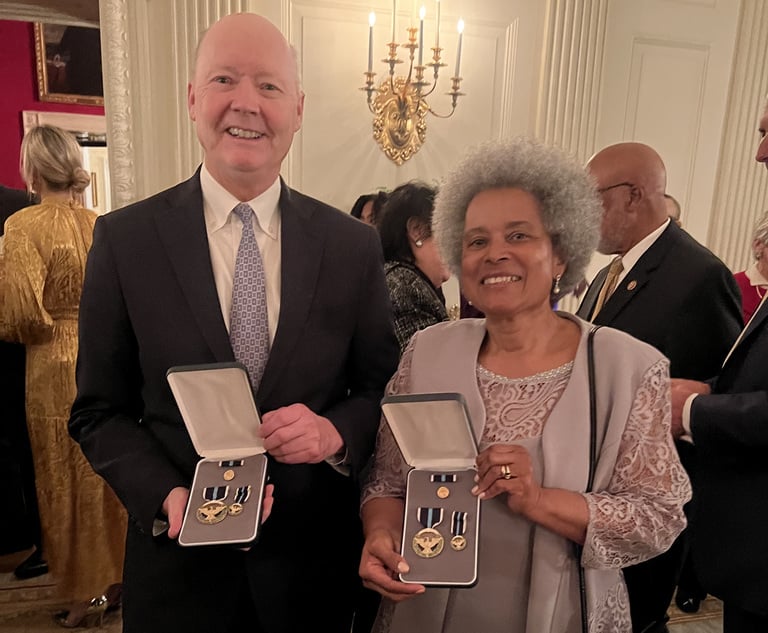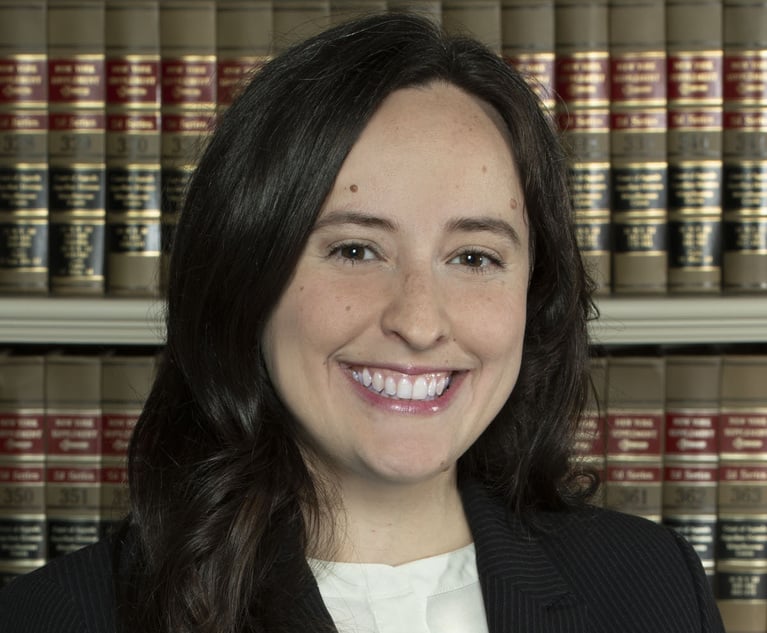Stark Wipes Out $2.5 Billion Verdict in Hep C Drug Patent Case
A Delaware federal judge on Feb. 16 overturned a massive $2.5 billion jury verdict against Gilead Sciences Inc., finding that a patent held by a unit of Merck & Co. Inc. was too broad to be valid.
February 20, 2018 at 03:46 PM
4 minute read
 Photo Credit: Fotolia
Photo Credit: Fotolia
A Delaware federal judge on Feb. 16 overturned a massive $2.5 billion jury verdict against Gilead Sciences Inc., finding that a patent held by a unit of Merck & Co. Inc. was too broad to be valid.
The ruling from U.S. District Chief Judge Leonard P. Stark of the District of Delaware reversed a federal jury's finding in 2016 that Gilead had willfully infringed on Idenix Pharmaceutical's patent, which discloses a “groundbreaking” treatment for hepatitis C. The verdict was the largest-ever reported in a patent, according to defense counsel in the case.
In a 50-page opinion, Stark wrote that the patent failed to meet a requirement that it disclose how to make and use the treatment without undue experimentation. Stark called the evidence Gilead presented during a 10-day trial “devastating,” and he said no reasonable jury could have found Idenix's patent valid.
“As a matter of law, based on the undisputed facts and the facts that, although disputed, a reasonable factfinder would have to have found (by clear and convincing evidence), the '597 patent is invalid due to lack of enablement,” Stark said, granting Gilead's motion for judgment as a matter of law on validity.
Merck said in a statement that the result did not reflect the facts of the case and vowed to take an appeal to the U.S. Court of Appeals for the Federal Circuit.
Meanwhile, Gilead's multi-firm team of attorneys from Orrick, Herrington & Sutcliffe, Fish & Richardson and Irell & Manella celebrated the ruling, as they prepare for the inevitable appellate fight.
“I'm particularly proud to be affiliated with Gilead, which never wavered in the face of extraordinary pressure, and whose in-house lawyers were integrally involved at every step,” Orrick partner Josh Rosenkranz said in a statement. “We look forward to working with the same team to defend this win on appeal.”
Merck subsidiary Idenix sued in 2013 over Gilead's blockbuster hepatitis C drug sofosbuvir, which is marketed under Sovaldi and other brand names and has been credited with saving millions of lives from the viral disease. It has also led to billions of dollars in revenue for the Foster City, California-based Gilead.
Sofosbuvir was developed by Pharmasset Inc. and later acquired by Gilead. According to Idenix, Pharmasset founder Raymond Schinazi stole the idea of using “two-prime (2')-methyl up modified nucleosides” to treat hepatitis C, or HCV. The company said Pharmasset chemist Jeremy Clark then used Idenix's patent application to develop his breakthrough 2'-methyl up 2'-fluoro down compound that became sofosbuvir.
Jurors in Stark's court rejected Gilead's challenges to the patent's validity and awarded Idenix $2.54 billion in damages at the close of a trial in December 2016. They also found that Gilead had acted willfully, opening the door to treble damages in the case. According to Delaware Law Weekly affiliate The Recorder, Idenix had asked Stark to “at least double” the award to more than $5 billion.
Stark upheld the jury's finding of willfulness in September. But he declined to enhance the damages, sounding a note of skepticism at the jury's findings.
“If the only thing Pharmasset/Gilead did was to 'deliberately copy' Idenix's discovery that a 2'-methyl up modified nucleoside could be effective in treating HCV, that was not nearly enough to arrive at sofosbuvir,” he wrote at the time.
On Feb. 16, Stark said the scope of the patent's claims included “many thousands,” if not billions, of compounds, which would have required “extensive” experimentation in order to synthesize the patented compound. And given the “novelty and infancy” of the field, it would be impossible for a person of ordinary skill to visualize all the embodiments of the claims.
“Hence, a reasonable factfinder could only reach one conclusion: that the range of 1
potential candidates is and was substantial, and that testing played an indispensable and
exploratory—rather than confirmatory—role in a POSA's attempts to practice the patent's
claims,” he said.
Idenix was represented by attorneys from Jones Day and Ashby & Geddes.
The case is captioned Idenix v. Gilead Sciences.
This content has been archived. It is available through our partners, LexisNexis® and Bloomberg Law.
To view this content, please continue to their sites.
Not a Lexis Subscriber?
Subscribe Now
Not a Bloomberg Law Subscriber?
Subscribe Now
NOT FOR REPRINT
© 2025 ALM Global, LLC, All Rights Reserved. Request academic re-use from www.copyright.com. All other uses, submit a request to [email protected]. For more information visit Asset & Logo Licensing.
You Might Like
View All
Fed Judiciary Panel Mulls Authority to Ban In-State Bar Admission Requirements

Delaware Legal Figures Who Played Key Roles in Ending School Segregation Honored With Presidential Citizens Medal
3 minute read

Trending Stories
- 1Brogdon: The Final Nail in Corbin’s Coffin in Premises Cases
- 2What to Know About the New 'Overlapping Directorship' Antitrust Development
- 3'Quiet, Appropriate End:' NY Court of Appeals Formally Removes Erin Gall From Bench
- 4Just One Cookie? Justices to Decide Liability for Half-Truths
- 540% Contingency: A New Ruling Just Cost This Plaintiff Team $827K in Legal Fees
Who Got The Work
Michael G. Bongiorno, Andrew Scott Dulberg and Elizabeth E. Driscoll from Wilmer Cutler Pickering Hale and Dorr have stepped in to represent Symbotic Inc., an A.I.-enabled technology platform that focuses on increasing supply chain efficiency, and other defendants in a pending shareholder derivative lawsuit. The case, filed Oct. 2 in Massachusetts District Court by the Brown Law Firm on behalf of Stephen Austen, accuses certain officers and directors of misleading investors in regard to Symbotic's potential for margin growth by failing to disclose that the company was not equipped to timely deploy its systems or manage expenses through project delays. The case, assigned to U.S. District Judge Nathaniel M. Gorton, is 1:24-cv-12522, Austen v. Cohen et al.
Who Got The Work
Edmund Polubinski and Marie Killmond of Davis Polk & Wardwell have entered appearances for data platform software development company MongoDB and other defendants in a pending shareholder derivative lawsuit. The action, filed Oct. 7 in New York Southern District Court by the Brown Law Firm, accuses the company's directors and/or officers of falsely expressing confidence in the company’s restructuring of its sales incentive plan and downplaying the severity of decreases in its upfront commitments. The case is 1:24-cv-07594, Roy v. Ittycheria et al.
Who Got The Work
Amy O. Bruchs and Kurt F. Ellison of Michael Best & Friedrich have entered appearances for Epic Systems Corp. in a pending employment discrimination lawsuit. The suit was filed Sept. 7 in Wisconsin Western District Court by Levine Eisberner LLC and Siri & Glimstad on behalf of a project manager who claims that he was wrongfully terminated after applying for a religious exemption to the defendant's COVID-19 vaccine mandate. The case, assigned to U.S. Magistrate Judge Anita Marie Boor, is 3:24-cv-00630, Secker, Nathan v. Epic Systems Corporation.
Who Got The Work
David X. Sullivan, Thomas J. Finn and Gregory A. Hall from McCarter & English have entered appearances for Sunrun Installation Services in a pending civil rights lawsuit. The complaint was filed Sept. 4 in Connecticut District Court by attorney Robert M. Berke on behalf of former employee George Edward Steins, who was arrested and charged with employing an unregistered home improvement salesperson. The complaint alleges that had Sunrun informed the Connecticut Department of Consumer Protection that the plaintiff's employment had ended in 2017 and that he no longer held Sunrun's home improvement contractor license, he would not have been hit with charges, which were dismissed in May 2024. The case, assigned to U.S. District Judge Jeffrey A. Meyer, is 3:24-cv-01423, Steins v. Sunrun, Inc. et al.
Who Got The Work
Greenberg Traurig shareholder Joshua L. Raskin has entered an appearance for boohoo.com UK Ltd. in a pending patent infringement lawsuit. The suit, filed Sept. 3 in Texas Eastern District Court by Rozier Hardt McDonough on behalf of Alto Dynamics, asserts five patents related to an online shopping platform. The case, assigned to U.S. District Judge Rodney Gilstrap, is 2:24-cv-00719, Alto Dynamics, LLC v. boohoo.com UK Limited.
Featured Firms
Law Offices of Gary Martin Hays & Associates, P.C.
(470) 294-1674
Law Offices of Mark E. Salomone
(857) 444-6468
Smith & Hassler
(713) 739-1250






